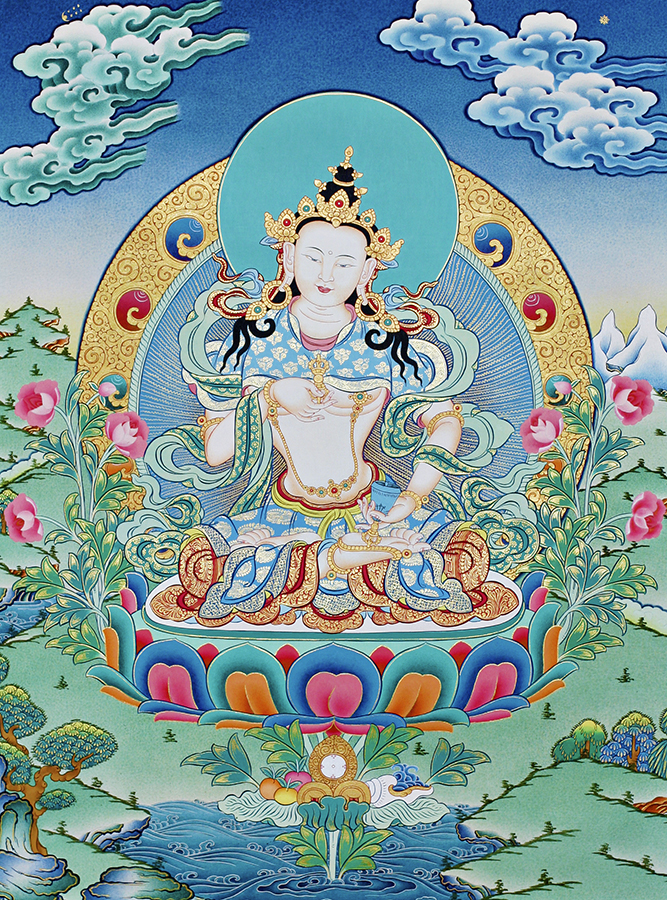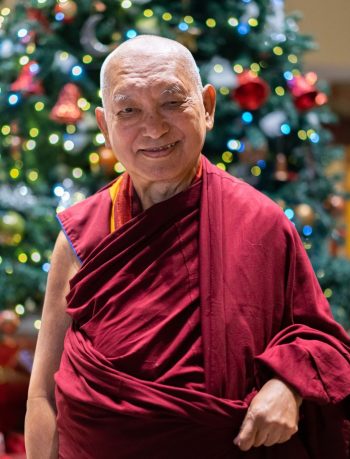In 1971, Lama Thubten Yeshe gave a series of talks at Kopan Monastery, in Nepal, at the end of the month-long Kopan meditation course. As Christmas drew near, Western students were feeling a little out of place and unsure...
 In 1971, Lama Thubten Yeshe gave a series of talks at Kopan Monastery, in Nepal, at the end of the month-long Kopan meditation course. As Christmas drew near, Western students were feeling a little out of place and unsure of what to do with their feelings of “missing out on Christmas.” Lama Yeshe, sensing their confused feelings, had them gather in the meditation hall where he talked about Christmas and Buddhist practice. The talks Lama Yeshe gave from this period are collected into the book Silent Mind, Holy Mind.
In 1971, Lama Thubten Yeshe gave a series of talks at Kopan Monastery, in Nepal, at the end of the month-long Kopan meditation course. As Christmas drew near, Western students were feeling a little out of place and unsure of what to do with their feelings of “missing out on Christmas.” Lama Yeshe, sensing their confused feelings, had them gather in the meditation hall where he talked about Christmas and Buddhist practice. The talks Lama Yeshe gave from this period are collected into the book Silent Mind, Holy Mind.
First published in 1978 by Wisdom Publications, the book has been out of print for many years. With the kind permission of Wisdom’s director, Daniel Aitken, the Lama Yeshe Wisdom Archive has created the second edition (2024), which includes the original collection of talks given by Lama Yeshe at Kopan Monastery on Christmas Eve, as well as another Christmas talk and a Cistercian priest’s tribute to Lama after he passed away in 1984. Please read the thoughtful preface to this collection by editor Nick Ribush.
Here we share an excerpt from Chapter 4 of Silent Mind, Holy Mind, which is from a talk given by Lama Yeshe in 1982 at Istituto Lama Tzong Khapa in Pomaia, Italy. We are also so pleased to share a joyous video of this teaching:
Christmas, 1982
By Lama Yeshe
Somehow, we’re still alive and aware enough to remember how long it is since Jesus was born. It was one thousand, nine hundred and eighty-two years ago, right? And I myself am fortunate enough to have been born in the Shangri-la of Tibet, to have come into contact with the world of Western dakas and dakinis, and to have this chance to acknowledge the history of the holy
guru, Jesus.
I’ve found that having a little understanding of Jesus’s life helps me develop my own path, but it’s not easy to fully understand the profound events in Jesus’s life. It’s quite difficult. Of course, the superficial events of his life are fairly easy to understand, but there’s not enough room in our mind to comprehend his high bodhisattva actions. Even when Lord Jesus and Lord Buddha were here on earth it was very difficult for ordinary people to understand who they really were. At that time, very few people understood.
Today I was looking at the Bible, at the Gospel of John in particular, and he was talking about the miracles Jesus performed and how few people understood the profundity of his liberated mind that allowed him to perform those miracles.
Anyway, whenever I’m at a meditation course such as this at Christmas time, I like to talk about this kind of thing. But you need to understand that when I do, I’m not trying to be diplomatic. I don’t need to negotiate my relationship with you in that way. It’s just that from the bottom of my heart, I sincerely feel and believe that simply to remember Jesus’s life is an incredible opportunity.
In a way, of course, it doesn’t matter where people come from— East or West—or what color they are, those who eliminate their self-cherishing thought and give their life for others are exceptional human beings. For that reason, I’m happy just to bring Jesus to mind and reflect on what he did.
Also, to some extent I’m responsible for my Western students’ psychological wellbeing, so if we’re going to bring Buddhism to the West, we need to do it in a healthy way rather than introduce it as some exotic new trip. We don’t need new trips—we need to do something constructive, something worthwhile. Anything truly worthwhile does not diminish any light; it only enhances it.
And with respect to psychological health, we’re part of the environment and the environment is part of us. Therefore, those of us who were born in the West should not reject the Christian environment into which we were born. We should consider ourselves lucky to have been born into a Christian society and to have the wisdom to understand what that means for our mind. Such understanding is very useful if we’re to remain healthy. Especially these days, when there’s dangerous revolutionary technology everywhere and the world is overwhelmed with fighting and war, we really need to actively remember the lives of our unselfish historical predecessors.
So, John was explaining how God sent Jesus to us as a witness to the truth, but most unfortunately, some ignorant people failed to recognize who he was or understand what he was teaching and killed him. In my opinion, the Buddhist point of view is that Jesus was a bodhisattva, not only in the sense that he had realized bodhicitta and overcome selfishness, but in the sense that, as a performer of miracles, he was a saint, like Tilopa and Naropa or, to name a living example, His Holiness Zong Rinpoche—somebody completely free of superstition who sometimes instinctively does strange things that the rest of us don’t understand.
For example, John says that one day Jesus was near the water when a woman came by to fill her pot. Jesus said to her, “How can you satisfy your thirst with water? It’s water that makes you thirsty in the first place.” He told her that since it’s water that makes her thirsty, how can water be the solution to her thirst. It’s some kind of reverse thinking. Who can understand that? It sounds crazy, doesn’t it?
What he meant was that only spiritual water can truly slake your thirst. So you can see, the actual meaning is somehow beyond words. The woman’s taking water; he says, “Why are you doing that? It’s not going to solve your problem of being thirsty.” It’s crazy talk. Nowadays we’d probably hit somebody who spoke to us like that. But luckily, back then Jesus didn’t get beaten up for talking in that way.
John also said that since Jesus was born from God, his disciples were also derived from God’s energy. That’s similar to what the Buddhist teachings say when they explain that all shravakas and pratyekabuddhas are born from Shakyamuni Buddha. The sense here is that such followers are born from the teacher’s wisdom truth speech. Through internalizing that, they discover the truth for themselves and become such realized beings.
Philosophically, of course, we can say that Buddhism doesn’t accept that God is the source of all human beings and other things. But from another point of view, we can say that Buddhism doesn’t contradict that statement either. For example, where does the human realm come from? The Buddha said that the human realm is caused by good karma. That’s true. If the upper realms do not come from good karma, then where do they come from? Then, from the Buddhist point of view, all good karma comes from the Buddha…or, you can say, God. Therefore, the human realm comes from God, from Buddha. Because of the Buddha’s holy speech, sentient beings create good karma. I want you to be clean clear about this.
Still, philosophically you can argue this point one way or the other. It depends on how you interpret it. You can interpret the statement negatively or positively. Actually, you can do anything with philosophy.
Now, concerning God, what is the different between Buddha and God? Today, I’m going to say that according to Buddhism and
Christianity, the qualities of the Buddha and the qualities of God are the same. People always worry about creation. “God is the creator of everything; Buddha is the creator of everything.” Does that mean the Buddha created negativity? Well, the Buddha said that ultimately, there’s no positive, there’s no negative.
Tibetans address this issue with the example of a river. When you’re standing on one bank of the river you call the opposite bank “the other side.” When you’re on that bank you call this one “the other side.” There’s this side and that side, that side and this side. It’s interdependent. Without each other, this side and that side wouldn’t exist. In the same way, if positive doesn’t exist, negative
can’t exist either. In other words, negative comes from positive, positive comes from negative.
Then maybe you’re going to argue, “Well, if God is the creator, if God is the cause of everything, such as organic things like plants, then how can God be permanent?” People say God is permanent—then how can something that’s permanent produce
something impermanent, like a plant? The principal cause of an impermanent phenomenon has to also be impermanent.
That sort of argument comes from Buddhists, so I’m going to debate with them: “Then how can you say shravakas and pratyekabuddhas are born from Buddha? Buddha is permanent.” The answer to that is that such statements are not meant to be taken literally. In response to that, I’m going to say, “Well, God can be the same as Buddha, in the sense of a personal being. God can be a person in the same way Shakyamuni Buddha was.” It’s not as if a permanent God is sitting up there somewhere. God can be something organic, a personal being with whom you can personally relate.
I tell you, philosophers always try to make everything very special. “God. Buddha. God is this; Buddha is that.” They put God and Buddha up on some kind of untouchable pedestal, so ordinary people can’t relate to them. They make it impossible to understand the nature of God, the nature of Buddha. That’s stupid. They just
create more obstacles for people.
Then human beings, with their limited minds, try to put cream on God, chocolate on God, like with a knife. They put their own garbage on God. That’s all wrong; definitely wrong. I truly believe that sometimes philosophy can become an obstacle to people really understanding the nature of God or Buddha. Maybe I’m a revolutionary, but I reject many of the philosophical positions on these matters.
However, personifying God or Buddha doesn’t contradict their omnipresent nature. We can talk about the personal qualities of Heruka, for example, but at the same time, he is universal and omnipresent. We need to understand that.
Excerpted from Silent Mind, Holy Mind, forthcoming from the Lama Yeshe Wisdom Archive, edited by Jon Landaw and Nicholas Ribush. Printed copy and ebook of the new edition of this text will be available mid-January 2024. Until then, you can read excerpts from this book online or download a free PDF.
Foundation for the Preservation of Mahayana Tradition (FPMT), is a Tibetan Buddhist organization dedicated to the transmission of the Mahayana Buddhist tradition and values worldwide through teaching, meditation and community service.










